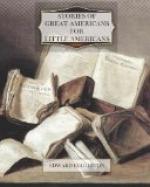[Illustration: Irving in Mischief.]
In those days naughty school-boys were whipped. Irving could not bear to see another boy suffer. When a boy was to be whipped, the girls were sent out. Irving always asked the schoolmaster to let him go out with the girls.
Like other boys, Irving was fond of stories. He liked to read about Sind-bad the Sailor, and Rob-in-son Cru-soe. But most of all he liked to read about other countries. He had twenty small volumes called “The World Dis-played.” They told about the people and countries of the world. Irving read these little books a great deal.
One day the schoolmaster caught him reading in school. The master slipped behind him and grabbed the book. Then he told Irving to stay after school.
Irving expected a pun-ish-ment. But the master told him he was pleased to find that he liked to read such good books. He told him not to read them in school.
Reading about other countries made Irving wish to see them. He thought he would like to travel. Like other wild boys, he thought of running away. He wanted to go to sea.
But he knew that sailors had to eat salt pork. He did not like salt pork. He thought he would learn to like it. When he got a chance, he ate pork. And sometimes he would sleep all night on the floor. He wanted to get used to a hard bed.
But the more he ate pork, the more he disliked it. And the more he slept on the floor, the more he liked a good bed. So he gave up his foolish notion of being a sailor boy.
Some day you will read Irving’s “Sketch Book.” You will find some famous stories in it. There is the story of Rip Van Win-kle, who slept twenty years. And there is the funny story of the Head-less Horse-man. When you read these a-mus-ing stories, you will remember the playful boy who became a great author.
[Illustration: Rip Van Winkle wakes up]
DON’T GIVE UP THE SHIP.
Fred was talking to his sister one day. He said,—
“Alice, what makes people say, ’Don’t give up the ship’?”
Alice said, “I don’t know. That’s what the teacher said to me yes-ter-day when I thought that I could not get my lesson.”
“Yes,” said Fred, “and that’s what father said to me. I told him I never could learn to write well.” He only said, “You must not give up the ship, my boy.”
“I haven’t any ship to give up,” said Alice.
“And what has a ship to do with my writing?” said Fred.
“There must be some story about a ship,” Alice said.
“Maybe grand-father would know,” said Fred. “Let’s ask him.”
They found their grand-father writing in the next room. They did not wish to disturb him. They turned to leave the room.
But grand-father looked up just then. He smiled, and laid down his pen.
“Did you want something?” he asked. “We wanted to ask you a question,” said Alice. “We want to know why people say, ’Don’t give up the ship.’”




